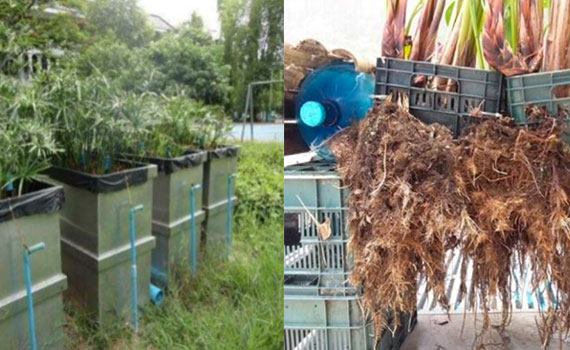Clean Water for people in Mexico and Thailand
This project addresses the global problem of providing clean running water for essential practices such as hand washing and daily baths to small communities in developing countries. This is a problem that received renewed attention in 2020 because of the importance of hand washing in the fight against COVID-19. It is not a new problem, however, since health problems due to poor sanitation hold back sustainable development lead to economic and social problems on a large scale worldwide. WAITRO members in Mexico and Thailand saw a common problem in how to provide clean water to small communities efficiently and at low cost, and found common interests in using plant-based systems to clean bacteria, nutrients, and possibly even viral contamination from waste water.
In rural of Mexico there is often insufficient infrastructure either for delivering water or for treatment of wastewater. In Mexico overall, 10% of the population (rising to 24% in Veracruz) does not have access to water in their home, which represents a health and hygiene problem. Veracruz State can be treated by existing conventional treatment facilities.
Early results showed a reduction in chemical oxygen demand, nutrients and phosphates. As a bonus, biomass from the plants can be harvested every 45 days or so, depending on the weather, and converted into biogas. When the advent of COVID-19 highlighted the need for good hygiene everywhere, INECOL therefore posted a challenge to SAIRA to look for partners in novel low-cost water treatment technologies using plant-based systems. A research team from TISTR in Thailand responded.To solve these problems, INECOL focused on plant-based technologies that offer the potential for clean water at 50 – 90% cost savings as compared to conventional technology. One example is “Phytofiltration Lagoons,” which are shallow constructed lagoons that receive polluted water and treat it using an aquatic plant such as water lettuce (Pistia stratiotes) or water hyacinth (Eichhornia crassipes). Other alternatives are expected to work similarly as long as the plant has a strong root system, high productivity under the local weather conditions, and a high tolerance for the toxic compounds present in the waste water.
Across the planet from Mexico, in many parts of Thailand, surface water quality is severely polluted, affecting various water uses as well as human health. In large cities, wastewater is usually treated using conventional technologies such as stabilization ponds, oxidation ponds, membrane filtration, etc. In small communities of Thailand, however, the main source of water pollution comes from domestic wastewater and agriculture. Treatment in conventional septic tanks alone cannot remove phosphorous and nitrogen to satisfactory levels, and high levels of these elements affect human health both directly and indirectly (by encouraging toxic algal blooms). Biological treatment alone is not highly efficient because bacteria cannot change phosphorous into a gas phase as they can with nitrogen. TISTR has therefore studied natural sorbents such as shells, clay, and ceramic media to immobilize phosphorus while also serving as a biomass growth support for anammox bacteria that can organically reduce excess nitrogen. Vigorous mixing, however, is found to reduce the efficacy of nitrogen removal and so TISTR developed a “constructed wetland” concept using umbrella sedge (cyperus involucratus) to immobilize the sorbent.
INECOL, based in Veracruz, Mexico, was a new WAITRO member in 2019. TISTR is a longtime WAITRO member and is currently the WAITRO Regional Focal Point for Asia. The joint team is led by Prof. Eugenia J. Olguin, Senior Researcher at INECOL and Dr. Siriporn Larpkiattaworn, Director of Innomat at TISTR. Together they bring 40 years of experience in water treatment to the problem.
By the end of their “WAITRO Innovation Award” year, the team expects to have 3 demonstrations of phytotechnology water purification running in each country. They hope that these demonstrations will spur follow-on investments to commercialize the technologies. Each dollar invested in water and sanitation potentially provides a four dollar return from lower health costs, increased productivity, and fewer covid-19 deaths, so the WAITRO-supported project should be a prime candidate for the trend of “bankable” sustainability projects.
Details

Date: 2021
Location: Mexico & Thailand
Project Partner: INECOL (Mexico), TISTR (Thailand)
- SAIRA Projects
- WAITRO Funded Project
